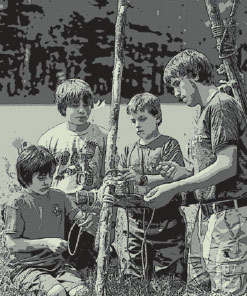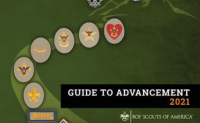 One of the most fascinating and fulfilling things about being part of the Scouting movement is watching our young people grow and develop as individuals, team members and leaders.
One of the most fascinating and fulfilling things about being part of the Scouting movement is watching our young people grow and develop as individuals, team members and leaders.
Every time I sit on a board of review (as I did for two new Eagle Scouts last week), I’m reminded that, in one way or another, the adults of our troop helped these young men grow. We did it, not by doing for them, but helping them see what’s important and how to handle it when they see it.
Many of us are used to dealing with our peers. At work, primarily, if we are responsible for some aspect of a team, we deal with each other on an adult level. Those who work with us are probably about the same level of functional development as ourselves, so we don’t have much of an opportunity to use our experience and talents to help younger leaders develop.
In Scouting, however, we do have that chance – but just how do we help a young person grow as a leader?
In an article 32 Things to Say to Young Leaders, leadership pro Dan Rockwell provides some insightful questions to ask of someone who is learning the ropes of leadership, and that would include our Scouts. You can read them for yourself, but many of them apply directly in a Scouting context.
- Tell me where you’re going. How will you know when you get there? Scouts often don’t know where they are going. They may plan an activity without giving the details and preparation much thought. Challenge them to consciously think about what it takes to pull off whatever they’re planning, and how they will know when they succeeded. Scouting’s unlike other activities such as sports, because there’s no scoreboard or game clock to tally your progress and keep track of time. It takes some deep thinking to know not only what the final score is, but when the clock has run out.
- What’s the next step? It’s easy to finish up something and think you’re making progress, but experience tells us that there’s always a next step to take. Leaders need to recognize what to do in order to keep moving forward.
- Tell me what’s important today. How does that build the future? A deep question that challenges our young leaders to think past the next five minutes and reflect on how what we’re doing today will make for a solid future, whether it’s learning skills or showing our youngest Scouts what leadership looks like.
- Tell me what you’ll do differently next time. A troop meeting goes overtime, or the planned skills instruction fell apart. A patrol’s dinner turned out to be a flop. Some reflection on what to do differently next time can help move them in the right direction. If they realize what they can do next time, they can help to see what works and what doesn’t. And related to this is:
- What should you stop? This is one part of the start-stop-continue evaluation tool that’s introduced in National Youth Leadership Training. The old saw about insanity as doing the same things over and over expecting different results is part of this. If something isn’t working, reflect on what we need to stop doing, but also what is working, and what we need to add to the mix. Liken it to a tomato sauce that needs less salt but more seasoning, even if the tomatoes are just fine.
- Why do you matter? This is a tough one for a young person to think about. It makes them think about their role with respect to others and what their unique talents and attitude can bring to their patrol or to the troop. Personal questions like this are some of the most difficult to ponder and can be among the most powerful at shaping a growing leader.
In Scouting, unlike most other youth programs, we have a one-of-a-kind opportunity to grow young people into responsible, respectful adults. It’s up to us to make the process meaningful, for we only have a short time to make a huge impact.
This post first appeared on Bobwhite Blather.



